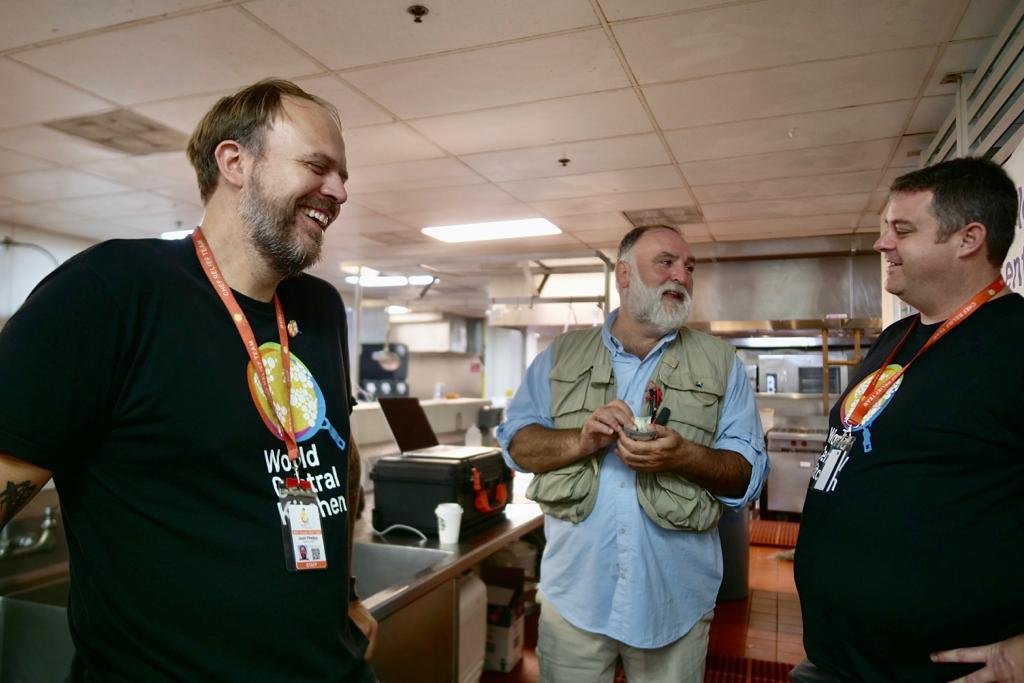NASSAU, BAHAMAS – Two months since Hurricane Dorian raked communities in Abaco and Grand Bahama, World Central Kitchen has cooked and served more than 1.5 million hot meals.
WCK Relief Operations manager Josh Phelps told Eyewitness News Online the non-profit non-governmental organization (NGO) has no plans of pulling up stakes anytime soon.
Field kitchens are cooking and serving more than 8,000 meals in Abaco and 20,000 meals in Grand Bahama per day.
“No way,” said Phelps.
“We’re going to be here until the need for us to be here physically no longer exists. If the numbers drop down to a certain amount where people don’t need two hot meals from us, and a local group could cover the need then we would prefer to work with them and offer assistance.
Phelps said: “Right now we’re not going anywhere, the need for hot meals per day remains about 8,000 to 10,000 in Abaco and 20,000 in Grand Bahama.”
“As for every project we do, we’ll stay until need is not there or if it makes more sense to assist locals,” he added.

In Abaco, Phelps said the WCK has moved its field kitchen further away from the port area with the installation of a semi-permanent tent structure. WCK is currently the main food provider on the island, according to Phelps, who said the numbers are climbing as more people return to the island.
Back in the capital, WCK has also moved its base of operation from the kitchens at Atlantis resort to the National Training Agency on Gladstone Road.
The organization has been cooking and serving up two meals per day for shelters across New Providence.
At its height, some 1,800 storm evacuees were housed at the Kendal G L Isaacs gymnasium. The number of displaced people living in shelters in Nassau now stands at just under 800.
Phelps said the organization has also enlisted the help of about eight people living at the gym as volunteers.
“Serving there we get to know people at the gym, some of the women and men have come up and said they want to help. They are just sitting there and want something to do, you get to know them.
“They’re preparing the food, then going back and serving, being able to have a daily life instead of being in the shelter all day.
Phelps said: “The other side of it is they are working alongside of us and other local Bahamians, who are giving their time and resources to come and make food too.
“It’s a nice cultural exchange that might not have happened otherwise.”

Phelps said the NGO will be partnering with Hands for Hunger and local churches to assist with cooking and serving hot meals.
“Sometimes we hire a local caterer and vendor to keep money in the community, but another way to do that is to keep mirroring our operation – buying food locally like we always do and working with the community,” Phelps said.
“We happened to find out the kitchen at NTA was open, another NGO was using it before and they had some staff we could keep on. It’s also more centrally located for volunteers.”
Phelps said the move will also allow WCK chefs to train more volunteers in how to provide large scale meals in the wake of natural disasters.
“We want to empower volunteer coordinators, it’s one of the reasons the NTA is taking it over. You can bring people in, we’re going to bring chefs, they can learn how to make 30 huge salads in 30 minutes. It’s a good learning opportunity. It’s a good partnership that makes sense at the NTA.”
WCK was founded in 2010 by celebrity chef José Andrés, and since then has grown to serve millions in disaster zones each year as “food first responders”.
The organization was among the first on the ground in Abaco following the deadly Category 5 storm – the strongest on record to hit the northern Bahamas.
In the early days, relief teams used helicopters to deliver hot meals and sandwiches prepared at the Atlantis kitchen in Nassau.
Logistics were “incredibly complex”, with the organization utilizing 30 vehicles, five helicopters, two seaplanes, a 220-foot ship, an amphibious vehicle, and four speedboats to deliver hot meals at more than 250 locations to date.
Phelps told Eyewitness News Online the volume of meals cooked and served in The Bahamas is second only to WCK’s efforts in Puerto Rico after Hurricane Maria in 2017.
“We never pull up stakes and just leave like that,” Phelps said.
“In Puerto Rico we have moved on to more sustainable farming and agricultural entrepreneurship.
“It’s like everywhere we go we maintain a presence,” he added.






